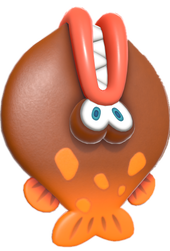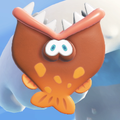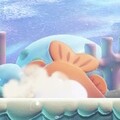Smackerel: Difference between revisions
From the Super Mario Wiki, the Mario encyclopedia
Jump to navigationJump to search
No edit summary |
|||
| Line 37: | Line 37: | ||
|Kor=넙쩍이 | |Kor=넙쩍이 | ||
|KorR=Neopjjeogi | |KorR=Neopjjeogi | ||
|KorM=Pun on "넙적" (''neopjeok'', "flat") and | |KorM=Pun on "넙적" (''neopjeok'', "flat"), "넙치 (''neopchi'', "olive flounder"), and "쩍쩍" (''jjeok-jjeok'', onomatopoeia for jaws opening), with the nominalizing suffix "~이" (''-i'') | ||
|PorA=Linguiado | |PorA=Linguiado | ||
|PorAM=From ''linguado'' ("flounder") and ''guiado'' ("guided") | |PorAM=From ''linguado'' ("flounder") and ''guiado'' ("guided") | ||
Latest revision as of 05:36, September 4, 2024
- This article is about the enemy in Super Mario Bros. Wonder. For the weapon in Mario + Rabbids Kingdom Battle, see List of weapons in Mario + Rabbids Kingdom Battle § Smackerel.
- Not to be confused with Snackeral.
| Smackerel | |||
|---|---|---|---|

| |||
| First appearance | Super Mario Bros. Wonder (2023) | ||
| |||
| |||
Smackerels are enemies that appear in Super Mario Bros. Wonder. They resemble flatfish, with both eyes on the same side of their body. They have large, sharp-toothed jaws. Smackerels appear only in the level Leaping Smackerel where they burrow through the sand, periodically jumping out vertically to attack the player character. During the Wonder Effect of the level, a giant Smackerel appears, which is able to bite through part of the level to help the player collect Wonder Tokens.
Their English name is a portmanteau of "smack" and "mackerel".
Gallery[edit]
Names in other languages[edit]
| Language | Name | Meaning | Notes |
|---|---|---|---|
| Japanese | ハイデン[?] Haiden |
Possibly from「海底」(hǎidǐ, "seabed" in Chinese), the English word "hide", and「デーン」(dēn, a comical onomatopoeia used to represent something dramatic happening) | |
| Chinese | 海蹬[?] Hǎidēng |
Transliteration of the Japanese name | |
| Dutch | Smackerel[?] | - | |
| French | Limange[?] | Portmanteau of limande ("dab") and manger ("to eat") | |
| German | Sandhechte[?] | Sand pickerel | |
| Italian | Sfondalone[?] | Portmanteau of sfondare ("to break through") and possibly pesciolone ("big fish") | |
| Korean | 넙쩍이[?] Neopjjeogi |
Pun on "넙적" (neopjeok, "flat"), "넙치 (neopchi, "olive flounder"), and "쩍쩍" (jjeok-jjeok, onomatopoeia for jaws opening), with the nominalizing suffix "~이" (-i) | |
| Portuguese (NOA) | Linguiado[?] | From linguado ("flounder") and guiado ("guided") | |
| Portuguese (NOE) | Perseguiçolha[?] | Portmanteau of perseguir ("to pursue") and solha ("flatfish") | |
| Russian | Нямбала[?] Nyambala |
Portmanteau of камбала (kambala, "flatfish") and ням (nyam, "nom") | |
| Spanish | Soterraballo[?] | Portmanteau of soterrar ("to bury") and rodaballo ("turbot") |




